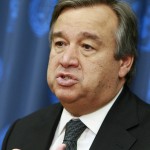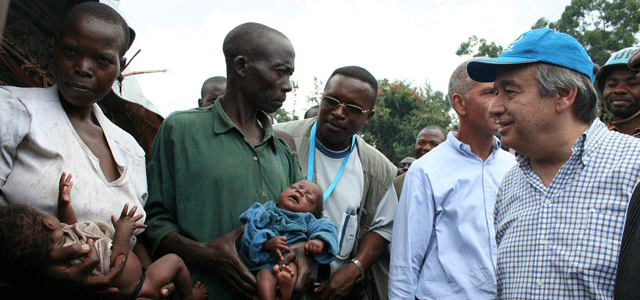
Update, 20 April 2010: Guterres nominated for 2nd 5-year term.
A significant multilateral post to be filled in 2010 will be the UN High Commissioner for Refugees, now held by Mr. António Guterres whose term expires on 14 June 2010.
Though the Statute for the Office of the UNHCR ascribes a three-year term to the post, the Secretary General and the General Assembly have almost invariably extended the office holder’s term from as much as two to five additional years once their initial appointments ended. Anticipating an extension at Mr. Guterres’ election in 2005, then-UNSG Kofi Annan and the General Assembly forewent the pretense of the statutory three-year term in appointing Mr. Guterres to the post for five years.
If UNSG Ban Ki-Moon is satisfied with Mr. Guterres’ performance, he can nominate him for another term, or as it is typically stated for the post of UNHCR, propose a further extension of his term. Doing so would simply involve a pro forma letter from the Secretary General to the General Assembly such as the mock-up below.
Draft UNGA resolution on UNHCR term of office
Should Mr. Guterres decide not to continue or UNSG Ban wish to appoint another person, Ban would instead send a similar letter proposing a candidate and term of office. Given the precedent of Mr. Guterres’ appointment to a five-year term, we could fully expect any successor to be appointed to a similar term, ending in 2015. (This year would also be Ban’s last year in office if he serves a second term and the year which the MDGs were to be met.)
The process of identifying and proposing a successor will be of particular interest to good global governance advocates. Mr. Guterres’ predecessors had been traditionally chosen from countries that had heavily invested in the agency’s work, but in 2005, UNSG Kofi Annan pursued a more transparent approach, soliciting names of potential candidates from Member States and civil society groups.
In the letter, the Secretary-General says that he can only be sure of finding the best person for one of the most important jobs in the UN system if the best qualified candidates come forward and are judged against transparent selection criteria, [UN Spokesperson] Mr. Eckhard added.
Ban suggested a similar interest in transparent appointment processes when he sought to identify a successor to Kemal Derviş as head of the UN Development Program. His eventual nomination of Helen Clark came
…at the end of an extensive selection process which included the establishment of a senior appointments panel chaired by the Deputy Secretary-General and consisting of senior UN officials as well as two outside experts in financial and developmental economics. The Panel was composed in a manner to reflect a combination of required expertise and skills as well as gender and geographical balance. The Panel was entrusted with interviewing the short-listed candidates and recommending the finalists for the Secretary-General’s consideration.
(More on this “senior appointments panel” in a future post)
As shown in the mock-up resolution above, the General Assembly will be taking up Mr. Guterres’ re-appointment or his successor’s election within the next few months as item 111(b) of the Assembly’s 64th Session Agenda (PDF), but it not yet been scheduled. When it is scheduled or there is some indication whether Mr. Guterres will continue in his post, we’ll revisit the processes and actors involved.





